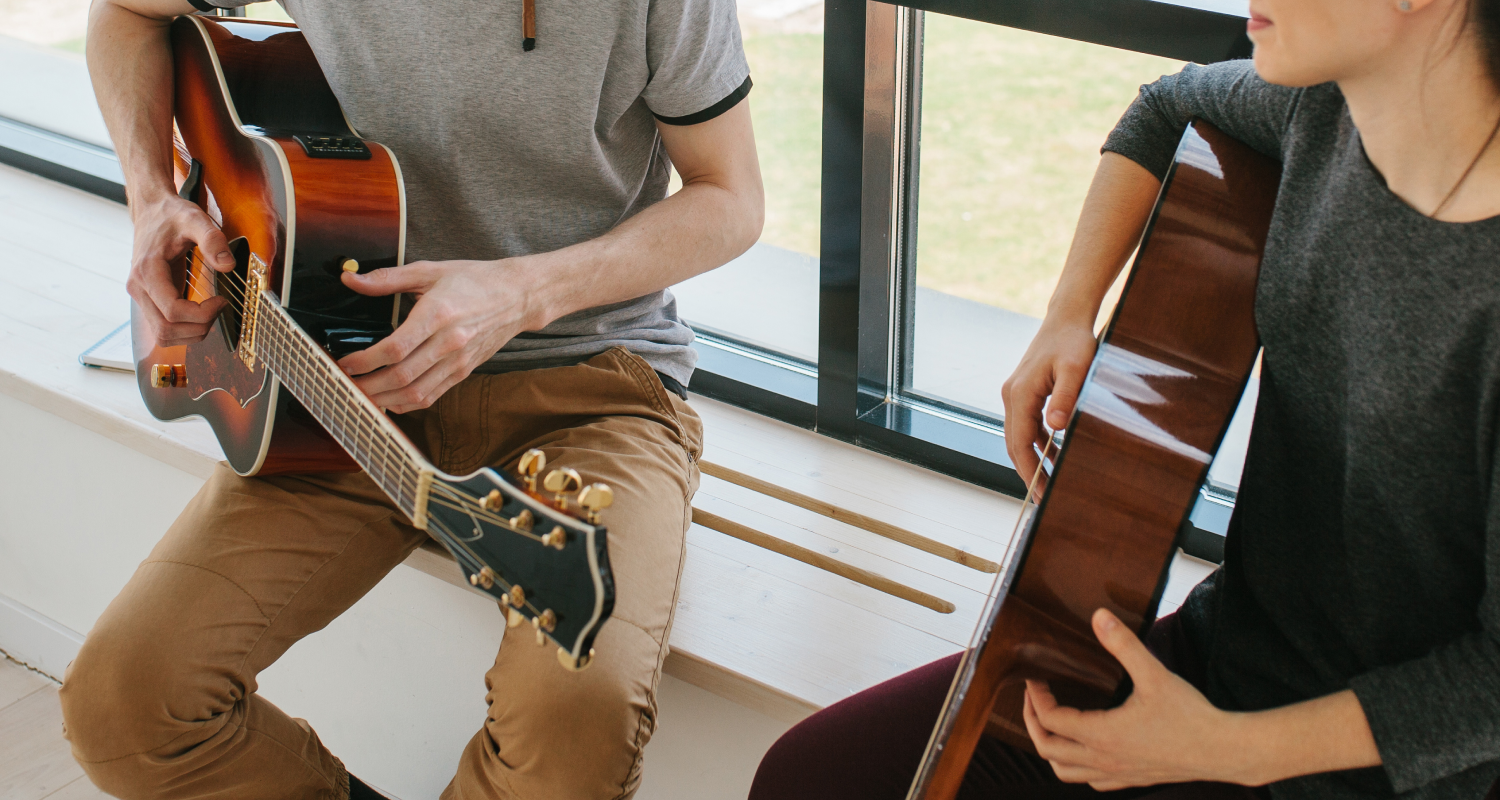
Life as a teacher and musician can be unpredictable, and sometimes feels like a balancing act. You want to maintain a steady income with a regular stream of students, whilst still finding time to work on your own music and taking opportunities to play professionally when they arise. So how can you achieve this? The key is to find a solid base of students who want to keep booking lessons, (and who will understand that you’ll need to reschedule lessons from time to time.) This resource is full of practical advice and ideas for how you can make private teaching work for you as a professional guitarist, and how you can attract students and keep them motivated to come to your lessons every week.

Of course, it goes without saying that you won’t get any students if nobody knows you’re out there. Building up a reputation and getting word of mouth referrals so that you don’t need to advertise is the holy grail here. But where do you start?

If you don’t have an online presence already, it might be time to think about creating one. Meeting your audience where they are is one of the central tenets of successful marketing. And if you’re targeting school-aged students then you’re more likely to find them online than anywhere else.
Most of your potential students will have social media accounts. Which platforms they are using will really depend on their demographic. Facebook is a good starting point if you’re looking to advertise to parents - after all, they’ll likely to be paying for the lessons so it makes sense to target them. With paid ads on social media, you can target your ad within a specific local area, so this is a great way to find potential students close to where you live.
Facebook's ads platform is relatively straightforward to get started with and allows you to advertise on:
Using the tools in the Facebook Ads platform, you'll be able to target people by demographic, location and their interests. If you're comfortable adding a simple bit of code to your website, then you'll be able to narrow your targeting to people who have already shown an interest in you, which will increase brand awareness and the likelihood that they'll return to your website.
Facebook offers free training about making use of their ads platform through Facebook Blueprint.
Having a YouTube channel is great for promoting yourself as well as a handy teaching tool where you can post regular teaching videos for students to access to help them with their practice at home. A few examples of guitar teachers already on YouTube include Joe Moreg, Daniel Whitting and Justin Sandercoe.
Having your own website will help to make you look more credible - potential students and parents are more likely to trust that you are a legitimate business. They’ll like being able to read a bit about your teaching approach, your prices and your location and availability as this will help them to make the right decision for them. Setting up your own website is a lot easier than you might think, and there are platforms you can use to create one for free. This guide to how to create a free website from Wix will help you to get started.
It may sound old-school, but why not put a card in the window at your local newsagents? You could include an introductory offer to entice would-be-students to visit your website or give you a call. This is a cost effective way to advertise - and you’re likely to meet potential students who live or work most locally to you.
Remember, it’s not just about where you promote yourself - it’s about how. If you’ve got professional credits, then shout about these in your advertising - students will want a teacher who has real industry experience and knowledge and who is already doing what they aspire to. Not only that, but being up front about the fact that you are a professional gigging musician will help to manage expectations from the start - so when the need to reschedule arises, your students (and their parents) will be a lot more understanding.
If you’ve had students in the past who have gone on to have success as professional musicians, be sure to mention this on your website or advertising. If there are several of them, why not have a “hall of fame” section on your website for successful alumni?
Or perhaps you’ve got a great pass rate for students who were entered for graded exams? If you have a good pass rate, or a track record for students achieving merit and distinction in graded exams, then don’t forget to mention this.
Hitting the right note with repertoire is crucial to building a successful teaching business. If students aren’t enjoying the material, they won’t want to keep coming back for more lessons. Asking students why they wanted to learn the guitar in the first place is a good place to start when choosing repertoire - it’s likely they were inspired by a particular song or artist.
Your students are not likely to be in a position to choose what they get taught at school, so giving them the freedom to do this in your lessons could be a great motivator. It’s also important to build a positive student-teacher relationships and establish trust. A long-lasting student teacher relationship takes work, but it’ll be worth the effort if you’re looking for a reliable source of income from your teaching work.

Whilst giving your students a say in what they play is crucial, it is also important to encourage them to branch out and build a varied repertoire - especially if they aspire to become professional musicians themselves. Choosing repertoire works best when it’s a collaborative exercise between student and teacher. This will help to ensure that your students feel they have a say in what they get taught, as well as making sure that they get what they need to achieve their long-term goals as musicians.
You need to find repertoire that is varied and challenging enough (without being too difficult) as well as catering to your students’ individual taste. To save time searching for new material or writing arrangements for students, you’d do well to invest in a series of books that covers a range of styles and levels so that you can focus on gigging, or drumming up more teaching business.
Introduce students to the songs and artists you love as well as teaching them the pieces they want to play. Inspire them with your enthusiasm and passion - if you’re enjoying what you’re teaching, then this will come across in the delivery and help to keep students motivated. The release of recent films like Bohemian Rhapsody, Yesterday and Rocket Man has helped to open young minds to ‘older’ music, so they might be more open to suggestions than you think.
If you’re teaching young students, their parents will likely be footing the bill - so it’s important to keep them on-side and help them to see the value of the lessons. Choosing some repertoire that they will recognise will help with this - and they’re more likely to support and encourage their child to practise in between lessons, too.
Technical skills should enable students to access the repertoire they want to play, rather than being taught for their own sake, or to tick a box on an exam syllabus.
It's often possible to leverage a student's interest in a particular piece of music to explore a particular technical skill.
If, for example, a student shows interest in The Beatles, then you can explore the use of staccato articulation in the rhythm guitar work on Penny Lane. Students showing an interest in folk-influenced music can be shown how to add basslines to a rhythm guitar part with careful coordination of left- and right-hand work.
Looking for the opportunities in students' musical interests can help you to find ways to encourage detailed learning of technical skills by placing them in context, rather than forcing you to resort to technical exercises.
Motivation really depends on the individual student - each will have their own special reasons for wanting to learn. But everyone has off-days, where they don’t feel like practising or coming to lessons. Being conscious of this and pre-empting it will help you to ensure things don’t go off the boil, and minimise the risk of students losing interest and giving up.
If you want students to keep coming back each week, think about how to get them excited about their next lesson. Make it a part of your teaching process to build a hook into each lesson will help to keep ennui at bay. Tell them at the end of each lesson what they’ll be covering in the next so they know what they’ll be learning - this will help give them a sense of progress. This works best in the wider context of a long-term goal - whether it’s perfecting a particular piece or technique over time, working towards passing a graded exam or practising for an upcoming performance.

If your students aren’t working towards a graded exam or performance, a reward to work towards might help to keep them motivated. This doesn’t have to cost you much - or anything at all. You could make your own certificates, or consider ordering some badges or stickers. Or, if you’ve got an impressive guitar collection, you could make it an incentive for hardworking students to have a go on some of your most prized axes.
Intrinsic motivation comes from giving context and purpose to what is being learned. Your industry knowledge is a huge source of potential inspiration here. Giving your students examples of when what they are learning has helped you as a professional musician will help them to see the end goal, giving them a reason to work harder.
You, the teacher are your students’ window into the professional music world. Sharing your experience and showing students what they could achieve if they carried on could be a great motivator. When gigs come up, why not invite them to attend? Of course, you’ll need to make sure that it’s age-appropriate and that they have their parent’s permission to attend (or a willing parent to accompany them). But seeing you in a different context could help reinforce how lucky they are to have you as their teacher. If your students then invite you to their own gigs, try not to miss the opportunity to return the favour - it’ll pay huge dividends in maintaining a long-term working relationship.
This is vital to keeping students motivated to attend your lessons every week. Of course, as a professional musician, it is to be expected that there will be times you will need to reschedule. This could even help to reinforce your image as a ‘real’ guitarist in your students’ eyes. It’s all about how you manage expectations. Make sure your students know when you take them on that you will sometimes need to change the time of their lesson. And, when gigs do come up, try to give us much notice as you can. If you have to cancel a lesson at the last minute for a gig, invite your students to attend (if it’s appropriate.) If not, make sure you offer to make it up to them with a longer lesson the following week.
Most of your students will have access to a smartphone, and will be familiar with apps and expect to use them. There are hundreds of apps out there that you can use to enhance your teaching, and many of them are free to download. This blog post outlines some of the most useful tools available.
The camera phone in itself is a useful teaching tool and recording device - use it to record demos of a particular teaching point or phrase, set exercises for homework, or film students performing so that they can see where they need to improve their posture and technique. Of course, if you are going to be filming students during your lessons you need to make their parents aware of this first and ensure that you use the student’s device to record and not your own.
Keeping parents engaged and happy is important if you’re looking to build a long-term teaching business - particularly for the word-of-mouth factor. So how do you manage this? What do parents really want?

When making an investment in anything, people want to know what they’re getting (and what they’re not getting) for their money. If you manage expectations from the start, you’ll avoid any issues or disappointment later. For example, share your track record for getting students through graded exams, but be careful not to make any promises you can’t keep, like a guarantee to pass within a set timeframe. Tell parents about your teaching process and style, giving them peace of mind that their child is getting lessons that are structured and designed to help them achieve their goals.
Ask any teenager how school was, and the answer is often a shrug followed by an “alright”. This isn’t going to help you to sell more lessons, so you might do well to fill in the gaps for parents who might be wondering what is going on in your weekly lesson. Make it a part of your routine to give parents a quick update after each lesson, or if that’s not possible you could email them a quick summary every month or so, highlighting their child’s achievements so far and outlining what’s next.
Your website comes in handy here - have a section for FAQs such as your cancellation policy and payment terms so that parents know where they stand from the off. You could even have a parent-student area that people can access once they join you with links to the teaching materials you use and any exercises for homework, and publish updates to inform parents of dates when you’re going to be on tour, or any upcoming gigs that students are welcome to attend. Whether or not you have a website, make sure you have a way of getting hold of parents to communicate any important information to them reliably.
There are numerous potential benefits to offering graded exams for your students and for the success of your business. For students, exams can be a great source of motivation - the sense of progression from one grade to the next, the experience of performing for an audience and the sense of satisfaction and achievement when they get their certificates. For your business, offering graded exams can help to build your reputation, lend you some prestige and validate your offer as well as demonstrating progress and adding value for parents.

If you do offer graded exams, it’s important that students feel they have a choice as to whether or not to enter. Whilst working towards a graded exam can be a great motivator, if they feel forced then this could have the opposite effect on your students.
For those that wish to enter for graded exams, choice is still a key consideration. As we’ve already mentioned in chapter 2, your students don’t get to decide the curriculum at school, so choose a specification that gives your students as much freedom as possible. Each learner is unique and will have different areas of strength and interest, so a specification that caters to a range of abilities and styles will ensure that all of your students get what they need.
If you’re looking for a flexible approach that covers a range of genres and techniques, have a look at our brand new Acoustic Guitar 2020-2023 syllabus. With a wide range of styles including folk, acoustic, rock & pop, jazz and blues, it is now easier for learners to play to their strengths and specialise, or to stretch and challenge themselves across a variety of styles and techniques. The books are now also in both tab and staff notation – making the content accessible to a wider audience of musicians.
We’ve created a handy at-a-glance guide to the new syllabus and requirements - simply click below to access it.
Accessibility |Contact us |Privacy statement |Modern slavery statement |Terms of Use |Trinity Policies
@ 2018 Trinity College London